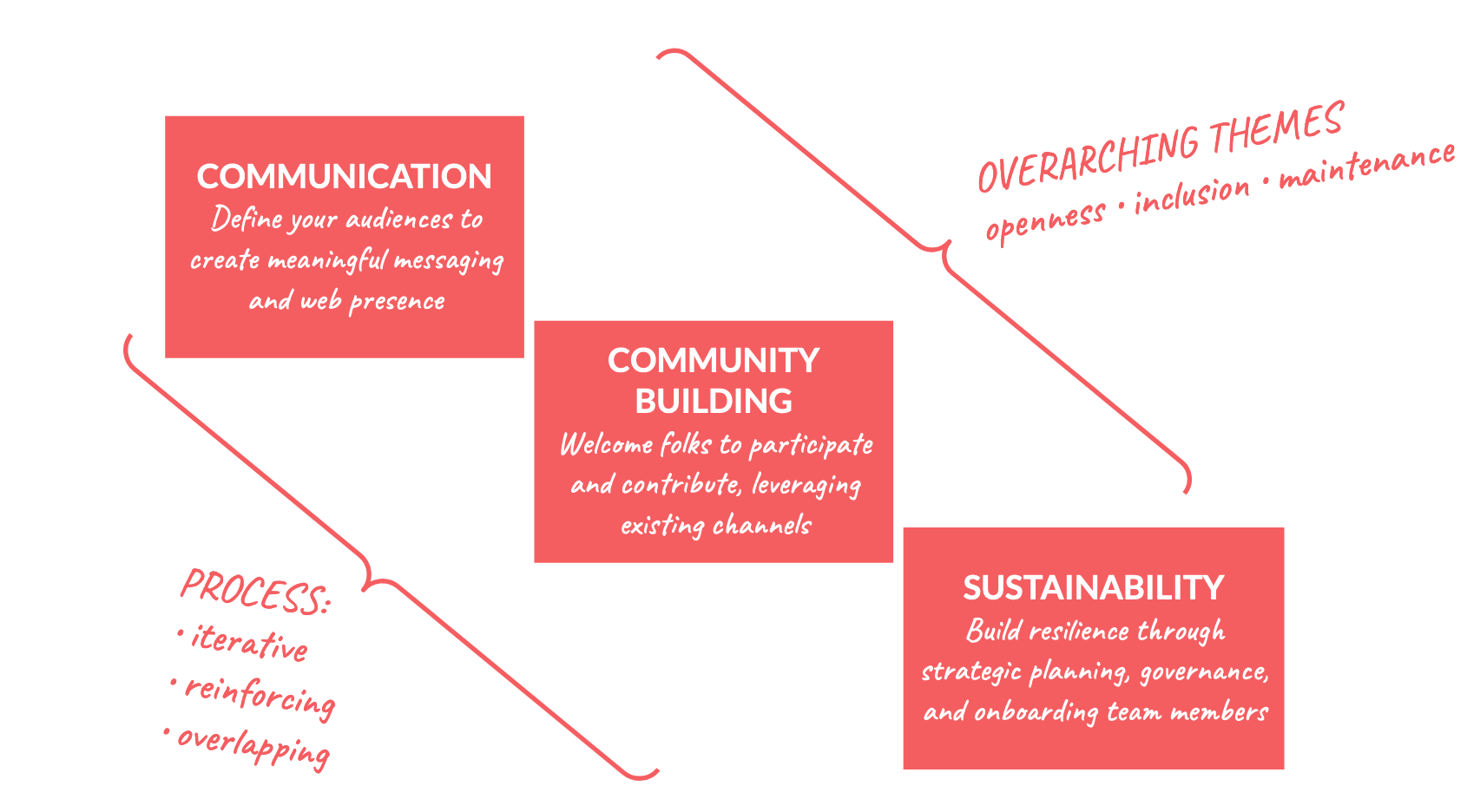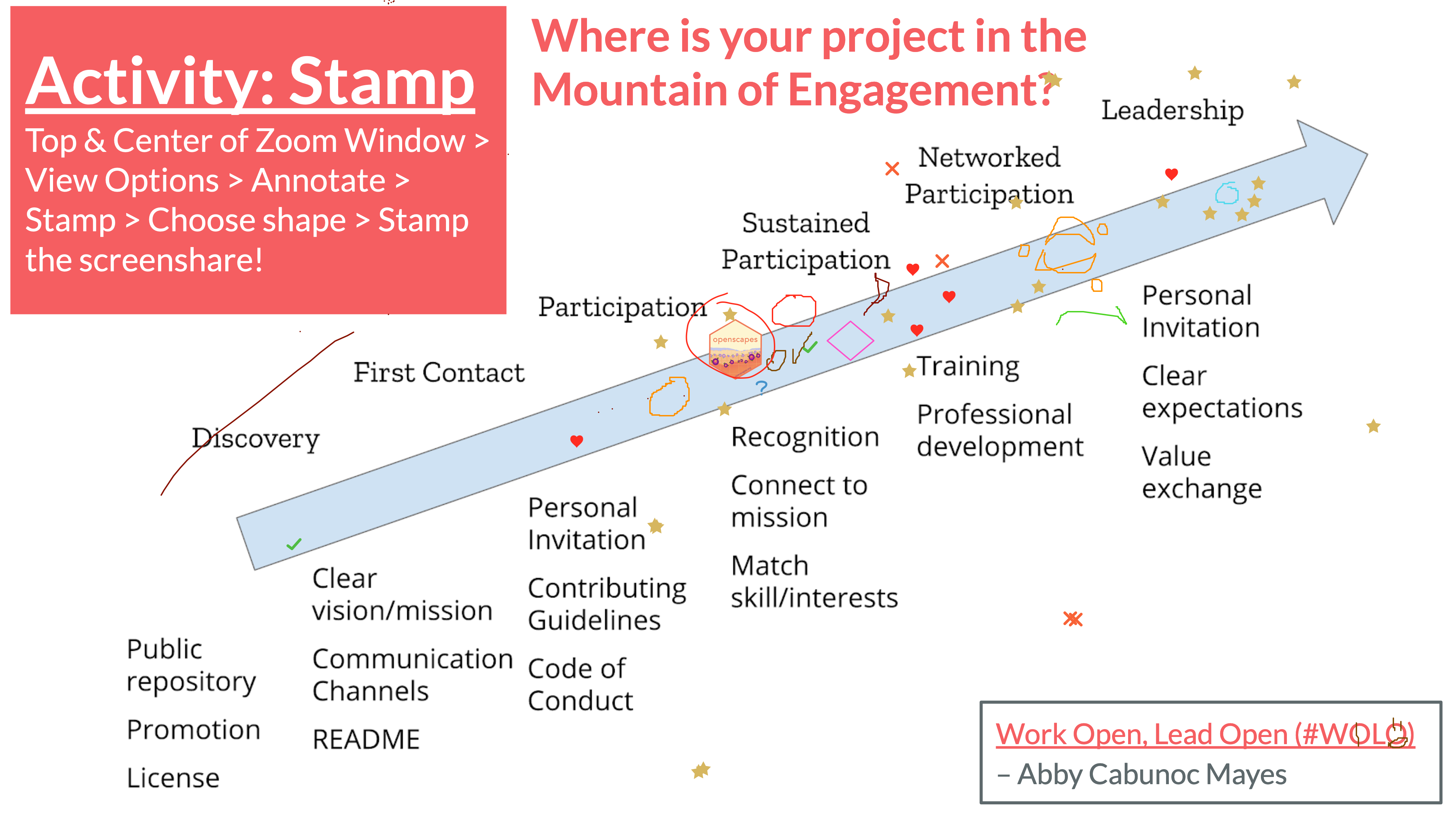Last month I was invited to give a workshop at the Chan Zuckerberg Initiative’s Essential Open Source Software virtual conference. The workshop was about Audience Building for Open Source Projects, focused on strategic planning and sustainability. I was both nervous and excited to give this workshop: nervous because I am by no means an expert in how to grow and sustain a project — Openscapes is still nascent! But I was excited because although I am not an expert, I do know a lot and was interested to pass forward what I’ve learned. This post is a quick overview and a summary of participant activites.
Quick links:
The Chan Zuckerberg Initiative’s Essential Open Source Software program supports and connects folks building open source software for science. I was very excited to attend to meet folks and learn about the cool things they are developing. And, I was excited to see a keynote by Kate Bouman, whose team used open algorithms and open data to “make” the first image of a black hole!
I was invited to give a workshop about audience building and strategic planning for open source projects. Here is the abstract I wrote for the workshop:
“Open source software is about more than code: it’s about welcoming a broadening audience to a shared vision and planning for sustainability. We’ll cover considerations for open source programs including messaging &”marketing”, onboarding, inclusion, community building, web presence & technology choices, and fundraising, using Openscapes strategies as a starting example.”
I framed the workshop in broad categories: communication, community building, and sustainability. We talked about each category in turn, although the process is not linear, it’s iterative, reinforcing, and overlapping. Essentially, there are many things to do at the same time that are all linked together. And the overarching themes that come up throughout the whole process — built into everything you do, into every decision you make — is openness, inclusion, and maintenance. So, for every decision you make, you should ask yourself: am I being as open as I can be, am I being as inclusive as I can be, and will I be able to maintain what I’m starting. This will help prioritize where you put your efforts.

I have learned so much from my mentors and many open projects that I have been introduced to in the past several years. I highlighted the main resources that frame my thinking for how I think about audience building:
- Mozilla Open Leaders
- Scientific Gateways Community Institute
- Open Source Alliance for Open Scholarship
I put additional references on each of the slides that you can refer to to learn more. I also had 3 silent activities throughout the workshop for folks to reflect on each of the categories we talked through. The first activity asked folks to respond in chat: What is a potential next step for you in terms of communication (audience, messaging, web)? Here are some of the responses:
- Blogs and/or guided lessons on how to use our tool
- Making our homepage messaging more inclusive for our various audiences
- Drafting a Slack community and user guide to share on our community Slack
- Tutorials
- User survey
- Email newsletter for communication.
- Re-thinking our community forum structure, in order to incentivize more people to engage and reward them for helping others
- Video onboarding
- Update our website, regular communication to community through newsletter, social media
- Redesigning the website, driven by specific user groups!
The second activity used Abby Cabunoc Mayes’ Mountain of Engagement image along with the “stamp” feature in Zoom: participants placed a stamp or drawing where they felt their project lands on this mountain. This was fun to see happen live! There are a lot of folks transitioning into Sustained Participation, Networked Participation, and Leadership:

Work Open, Lead Open (#WOLO)
The final activity asked folks to write responses in chat to the question: How could you use help with sustainability (strategic planning, governance, and onboarding)?
- Governance is the biggest question-mark in my org
- Challenges about gracefully moving back and forth between cycles of high-level strategic planning, and low-level “getting things done on the daily”
- Setting aside time to explicitly do this work. It tends to drop down the list of to-dos
- We need to test business models for longer term sustainability.
- Define and stick to a roadmap, and better communicate it with the community (and how expected timelines depend on contributions and funding)
- How do you convince project members that governance is worth discussing before the project has scaled up to the point where governance is clearly needed?
- Making onboarding easy
- Considering the most efficient way to do a gap analysis to inform these difference facets.
It was great to be able to chat further with the participants about these topics so that we can share insights and tackle them together. Thanks again to CZI for the invitation to lead this workshop: it was really fun to put together — and it helped me clarify things in my own head — and I appreciate all the engaged participants!